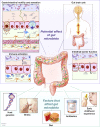Irritable bowel syndrome: a gut microbiota-related disorder?
- PMID: 27881403
- PMCID: PMC5283907
- DOI: 10.1152/ajpgi.00338.2016
Irritable bowel syndrome: a gut microbiota-related disorder?
Abstract
Irritable bowel syndrome (IBS) is one of the most common gastrointestinal (GI) disorders. Despite its prevalence, the pathophysiology of IBS is not well understood although multiple peripheral and central factors are implicated. Recent studies suggest a role for alterations in gut microbiota in IBS. Significant advances in next-generation sequencing technology and bioinformatics and the declining cost have now allowed us to better investigate the role of gut microbiota in IBS. In the following review, we propose gut microbiota as a unifying factor in the pathophysiology of IBS. We first describe how gut microbiota can be influenced by factors predisposing individuals to IBS such as host genetics, stress, diet, antibiotics, and early life experiences. We then highlight the known effects of gut microbiota on mechanisms implicated in the pathophysiology of IBS including disrupted gut brain axis (GBA), visceral hypersensitivity (VH), altered GI motility, epithelial barrier dysfunction, and immune activation. While there are several gaps in the field that preclude us from connecting the dots to establish causation, we hope this overview will allow us to identify and fill in the voids.
Keywords: GBA; IBS; VH; gut brain axis; gut microbiota; irritable bowel syndrome; visceral hypersensitivity.
Copyright © 2017 the American Physiological Society.
Figures

References
-
- Acosta A, Camilleri M, Shin A, Linker Nord S, O’Neill J, Gray AV, Lueke AJ, Donato LJ, Burton DD, Szarka LA, Zinsmeister AR, Golden PL, Fodor A. Effects of rifaximin on transit, permeability, fecal microbiome, and organic acid excretion in irritable bowel syndrome. Clin Transl Gastroenterol 7: e173, 2016. doi: 10.1038/ctg.2016.32. - DOI - PMC - PubMed
-
- Agrawal A, Houghton LA, Morris J, Reilly B, Guyonnet D, Goupil Feuillerat N, Schlumberger A, Jakob S, Whorwell PJ. Clinical trial: the effects of a fermented milk product containing Bifidobacterium lactis DN-173 010 on abdominal distension and gastrointestinal transit in irritable bowel syndrome with constipation. Aliment Pharmacol Ther 29: 104–114, 2009. doi: 10.1111/j.1365-2036.2008.03853.x. - DOI - PubMed
-
- Ait-Belgnaoui A, Durand H, Cartier C, Chaumaz G, Eutamene H, Ferrier L, Houdeau E, Fioramonti J, Bueno L, Theodorou V. Prevention of gut leakiness by a probiotic treatment leads to attenuated HPA response to an acute psychological stress in rats. Psychoneuroendocrinology 37: 1885–1895, 2012. doi: 10.1016/j.psyneuen.2012.03.024. - DOI - PubMed
-
- Bäckhed F, Roswall J, Peng Y, Feng Q, Jia H, Kovatcheva-Datchary P, Li Y, Xia Y, Xie H, Zhong H, Khan MT, Zhang J, Li J, Xiao L, Al-Aama J, Zhang D, Lee YS, Kotowska D, Colding C, Tremaroli V, Yin Y, Bergman S, Xu X, Madsen L, Kristiansen K, Dahlgren J, Wang J, Jun W. Dynamics and stabilization of the human gut microbiome during the first year of life. Cell Host Microbe 17: 690–703, 2015. doi: 10.1016/j.chom.2015.04.004. - DOI - PubMed
Publication types
MeSH terms
Grants and funding
LinkOut - more resources
Full Text Sources
Other Literature Sources
Medical

